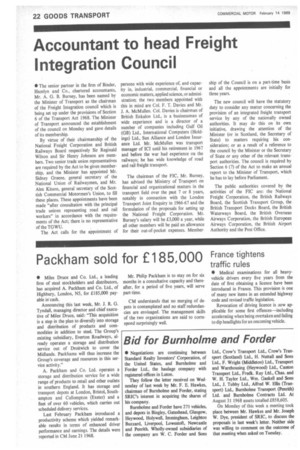Accountant to head Freight Integration Council
Page 24

If you've noticed an error in this article please click here to report it so we can fix it.
• The senior partner in the firm of Binder, Hamlyn and Co., chartered accountants, Mr. A. G. B. Burney, has been named by the Minister of Transport as the chairman of the Freight Integration council which is being set up under the provisions of Section 6 of the Transport Act 1968. The Minister of Transport announced the establishment of the council on Monday and gave details of its membership.
By virtue of their chairmanship of the National Freight Corporation and British Railways Board respectively Sir Reginald Wilson and Sir Henry Johnson are members. Two senior trade union representatives are required by the Act to be given membership, and the Minister has appointed Mr. Sidney Greene, general secretary of the National Union of Railwaymen, and Mr. Alex Kitson, general secretary of the Scottish Commercial Motormen's Union, to fill these places. These appointments have been made "after consultation with the principal trade unions representing road and rail workers" in accordance with the requirements of the Act; there is no representative of the TGWU.
The Act calls for the appointment of persons with wide experience of, and capacity in, industrial, commercial, financial or economic matters, applied science, or administration; the two members appointed with this in mind are Col. F. T. Davies and Mr. J. A. McMullen. Col. Davies is chairman of British Enkalon Ltd., is a businessman of wide experience and is a director of a number of companies including Gulf Oil (GB) Ltd., International Computers (Holdings) Ltd., Sun Alliance and London Insurance Ltd. Mr. McMullen was transport manager of ICI until his retirement in 1967 and before the war had experience on the railways; he has wide knowledge of road and rail freight transport.
The chairman of the FIC, Mr. Burney, has advised the Ministry of Transport on financial and organizational matters in the transport field over the past 7 or 8 years, notably in connection with the London Transport Joint Enquiry in 1966-67 and the formulation of the proposals for setting up the National Freight Corporation. Mr. Burney's salary will be £3,000 a year, while all other members will be paid an allowance for their out-of-packet expenses. Member
ship of the Council is on a part-time basis and all the appointments are initially for three years.
The new council will have the statutory duty to consider any matter concerning the provision of an integrated freight transport service by any of the nationally owned authorities. It may do this on its own initiative, drawing the attention of the Minister (or in Scotland, the Secretary of State) to matters requiring his consideration; or as a result of a reference to the council by the Minister or the Secretary of State or any other of the relevant transport authorities. The council is required by Section 6 (7) of the Act to make an annual report to the Minister of Transport, which he has to lay before Parliament.
The public authorities covered by the activities of the FIC are: the National Freight Corporation, the British Railways Board, the Scottish Transport Group, the British Transport Docks Board, the British Waterways Board, the British Overseas Airways Corporation, the British European Airways Corporation, the British Airport Authority and the Post Office.


















































































































